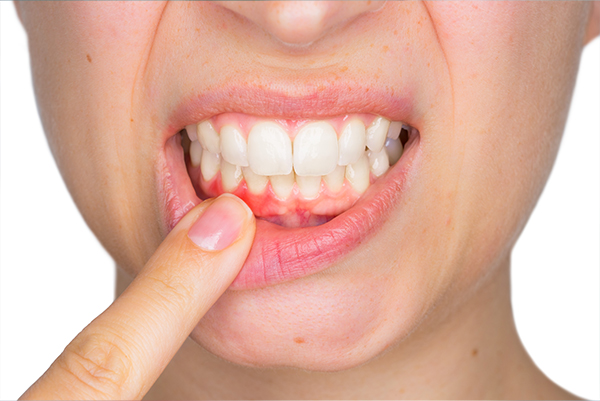What is a Gums Recession?
In dentistry, gingival recession (receding gums) is the exposure in the roots of the teeth caused by a loss of gum tissue and/or retraction of the gingival margin from the crown of the teeth.[1] Gum recession is a common problem in adults over the age of 40, but it may also occur starting from the teens.
When gum recession occurs, "pockets", or gaps, form between the teeth and gum line, making it easy for disease-causing bacteria to build up. If left untreated, the supporting tissue and bone structures of the teeth can be severely damaged, and may ultimately result in tooth loss.
Most people don't know they have gum recession because it occurs gradually. The first sign of gum recession is usually tooth sensitivity, or you may notice a tooth looks longer than normal. Typically, a notch can be felt near the gum line.
Why Do Gums Recede?
There are a number of factors that can cause your gums to recede, including:
- Periodontal diseases: By far the most common cause is gum disease.Inadequate brushing and flossing allows bacteria to build up between the teeth and below the gumline, which leads to painless, chronic inflammation of the gums and gradual recession, with increased tooth mobility as the supporting bone is lost.
- Overaggressive brushing: If you brush your teeth too hard or the wrong way, it can cause the enamel on your teeth to wear away and your gums to recede.
- Hereditary: Hereditary thin, fragile or insufficient gingival tissue predisposes to gingival recession.
- Grinding and clenching your teeth: Excessive clenching and grinding of the teeth (bruxism) can sometimes worsen pre-existing periodontal disease. By itself, bruxism may cause a reversible increase in tooth mobility, but not any gingival recession.
- Dipping tobacco: Tobacco users are more likely to have sticky plaque on their teeth that is difficult to remove and can cause gum recession.
- Tooth crowding: Abnormal tooth position, such as tooth crowding, giving inadequate cover of one or more teeth by the jaw bone.
- Body piercing of the lip or tongue: Jewelery can rub the gums and irritate them to the point that gum tissue is worn away.
How to treat Gum Recession?
The following surgical procedures are used to treat gum recession:
- Pocket depth reduction: During this procedure, the dentist or periodontist (gum doctor) folds back the affected gum tissue, removes the harmful bacteria from the pockets, and then snugly secures the gum tissue in place over the tooth root, thus eliminating the pockets or reducing their size.
- Regeneration: If the bone supporting your teeth has been destroyed as a result of gum recession, a procedure to regenerate lost bone and tissue may be recommended. As in pocket depth reduction, your dentist will fold back the gum tissue and remove the bacteria. A regenerative material, such as a membrane, graft tissue, or tissue-stimulating protein, will then be applied to encourage your body to naturally regenerate bone and tissue in that area. After the regenerative material is put in place, the gum tissue is secured over the root of the tooth or teeth.
- Soft tissue graft: There are several types of gum tissue graft procedures, but the most commonly used one is called a connective tissue graft. In this procedure, a flap of skin is cut at the roof of your mouth (palate) and tissue from under the flap, called subepithelial connective tissue, is removed and then stitched to the gum tissue surrounding the exposed root. After the connective tissue -- the graft -- has been removed from under the flap, the flap is stitched back down. During another type of graft, called free gingival graft, tissue is taken directly from the roof of the mouth instead of under the skin. Sometimes, if you have enough gum tissue surrounding the affected teeth, the dentist is able to graft gum from near the tooth and not remove tissue from the palate. This is called a pedicle graft.

